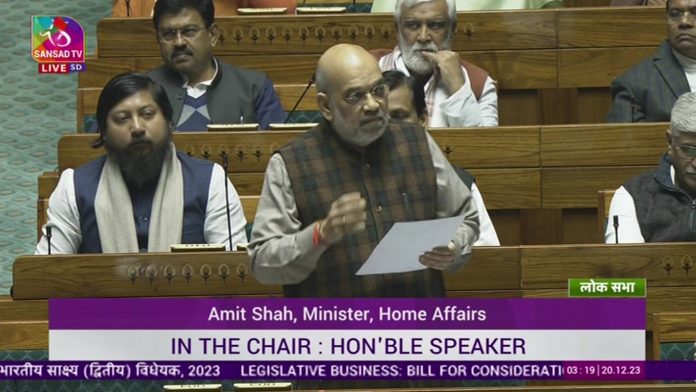NEW DELHI, Dec 20: Home Minister Amit Shah on Wednesday said the three bills to replace the colonial-era criminal laws seek to bring comprehensive changes to the criminal justice system with a human-centric approach and a focus on imparting justice instead of imposing penalties.
Replying to a debate on the Bharatiya Nyaya (Second) Sanhita, Bharatiya Nagarik Suraksha (Second) Sanhita and the Bharatiya Sakshya (Second) Bill in the Lok Sabha, Shah said the three proposed laws also have a clear definition of terrorism, scrap sedition as a crime and introduce a new section titled “offenses against the state”.
He said the three bills were drafted after comprehensive consultations and that he had gone through every comma and full stop of the draft legislations before bringing them before the House for approval.
He said the existing criminal laws – Indian Penal Code (IPC), Indian Evidence Act and the Code of Criminal Procedure (CrPC) – were reflective of the colonial mindset with the intention to punish and not impart justice.
“The three news bills seek to establish a justice system based on Indian thinking… Three proposed criminal laws will free people from colonial mindset and its symbols,” Shah said.
The Bharatiya Nyaya Sanhita seeks to replace the Indian Penal Code-1860, the Bharatiya Nagarik Suraksha Sanhita will replace the CrPC of 1973 and the Bharatiya Sakshya Bill will replace the Indian Evidence Act of 1872.
“For the first time, the criminal justice system will have the human touch. Till we repeal these old laws, we are still following laws made by the UK government. We still use English words like Her Majesty, British Kingdom, the crown, barrister, ruler after 75 years of independence,” Shah said.
The home minister said the colonial-era laws prioritised acts of “looting the treasury”, “uprooting rail tracks” and “insult to the Crown” over crimes against women and children, human rights, border security, and the army.
The old laws had listed rape under Section 375-376, the new bill has the crime listed under Section 63, murder was listed under Section 302 now it is Section 101, kidnapping was under Section 359 and now it is Section 136, Shah said.
Listing the features of the bills, he said, “This bill punishes mob lynching with death penalty. (Congress leader P) Chidambaram kept asking me what about mob lynching. He does not understand BJP and our mentality. Why did you not penalise mob lynching during your rule? If one’s mind is Indian, you will understand the laws. If it is Italian, you won’t.”
The three bills reflect the spirit of the Constitution…But those with an Italian mindset will never understand it,” he said in an apparent dig at the opposition Congress.
Shah asserted that the three laws were based on justice, transparency and fairness.
“This is the first Government which has fulfilled the promises it has mentioned in its manifesto. We have revoked Article 370, removed AFSPA in 70 per cent areas in the northeastern states, banned triple talaq and gave 33 per cent reservation to women in Parliament,” he said. (Agencies)


